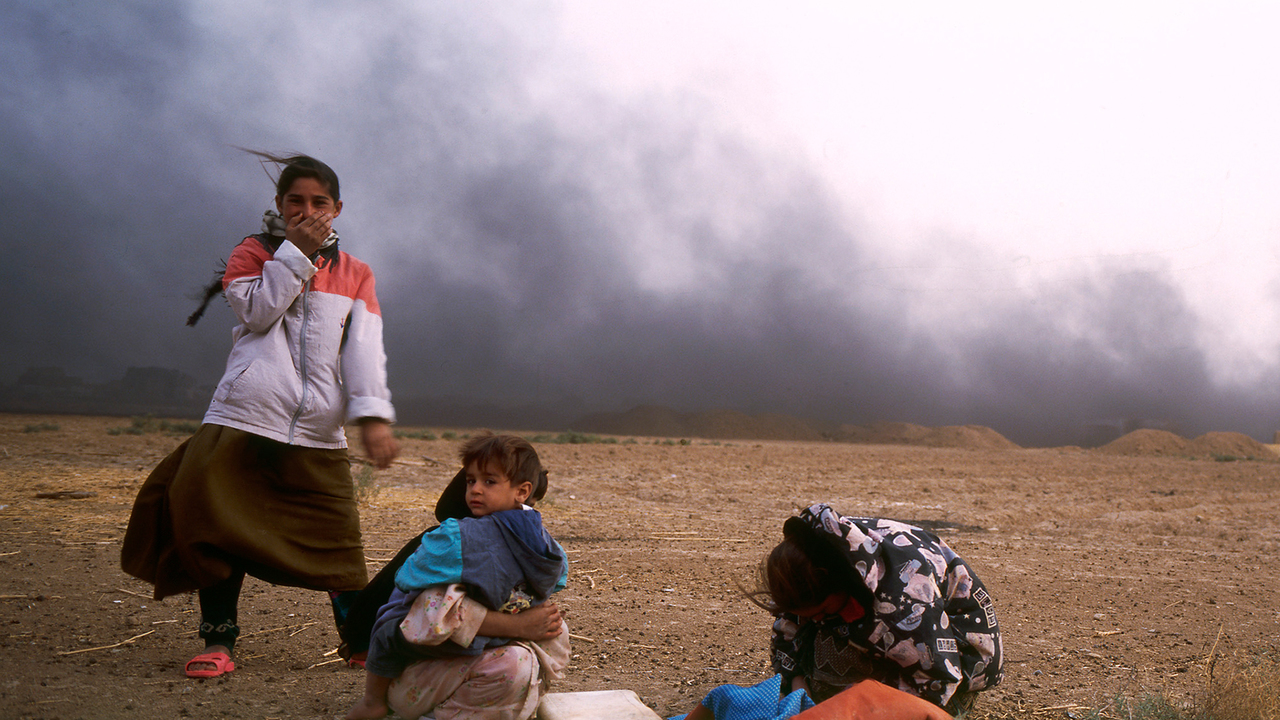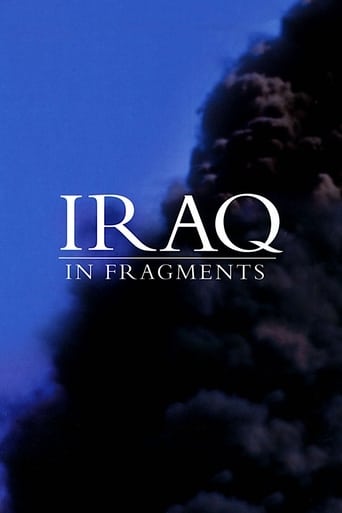

This is a tender, generous movie that likes its characters and presents them as real people, full of flaws and strengths.
... View MoreIf you like to be scared, if you like to laugh, and if you like to learn a thing or two at the movies, this absolutely cannot be missed.
... View MoreI think this is a new genre that they're all sort of working their way through it and haven't got all the kinks worked out yet but it's a genre that works for me.
... View MoreA clunky actioner with a handful of cool moments.
... View MoreThe most important thing lacking in my understanding of the problems in the Middle East and Iraq in particular is knowledge about the people and their beliefs. This film provides a tiny peephole into what drives Iraqis and what they feel is important. A very revealing aspect of the film is how Muslim religious leaders are able to get followers to exact justice upon those who don't agree with their religious beliefs. An incident where market vendors who are accused of selling alcohol are abused and kidnapped makes is easy to see how Iraqis, driven by religious zealots, can perpetrate such atrocities. Overall, this piece of work is amazing for its ability to get close to the everyday Iraqi and to give the viewer an unbiased glimpse of what life is like for them.
... View MoreWhile the cinematography is stunningly gorgeous, I found "Iraq in Fragments" to be mostly very disappointing, a shallow rehash of stereotypes of the 3 main sections of Iraq.First we get a little boy who's failed the first grade 2 or 3 times and professes to be loved and well-cared for by a boss who is rough and bullying to him, behavior that would be clearly labeled as abusive in the US. Granted in a much harsher, more violent society little Muhammed may be relatively well-off. But this roughness, the constant low-level violence and the threat of much worse, the cycle of failure and nostalgia for Saddam Hussein (Yes, he was terrible, but now is so much worse, they all say.) is simply what we already "know" from western press reports from the Sunni Arabs.The Shi'ite segment shows rough "justice" as suspects in a minor crime are kept imprisoned in blindfolds by what appears to be a vigilante squad. Here we see the prayers, processions, funerals, self-flagellation oh, those exotically religious Shi'ites! And the Kurds are shown as struggling to develop democracy. The little boy who is the focus has auburn highlights in his hair, showing these Kurds to be more western than the Arabs. Montage shots of boys in a field recall Eisenstein, images of youthful dreams of building a new future.The visual lessons of Eisenstein are much displayed here with wonderful montages, and the composition of this film alone makes it well worth watching. It is one of the most beautifully shot movies I've seen in a long time. Still, the content seems to be so much western hand-wringing over Arab violence, and the eventual dismemberment of the country (implied in the title) and hope for Kurdish democracy. (And here is the simplistic emotional uplift that softens the rest of the film.) The aesthetics of the movie are seductive and one can feel the visual poetry as being somehow more than that. Alas, it isn't. While the close presence and some of the time spent with individuals, particularly the young Sunni Arab and Kurdish boys, provide a sense of personal intimacy, they reveal no depth or complexity to the situations they live in, or any sense either of what holds Iraq together or what's tearing it apart. The framing of these three sections offers a sense of boundary and inevitability, objectifying the subjects, telling us nothing new about them or their situation, and encouraging distance and complacency among western viewers.
... View MoreThere are a lot of documentary films about Iraq now. Most of them are about US soldiers in Iraq -- and that's fine. But those films are really more about the US experience than about Iraq as a country.What IRAQ IN FRAGMENTS does is show the country, the people, that the US has occupied. And it does so with such beauty. I have never seen such a gorgeous documentary as this. The cinematography will knock your socks off. And so will the access Longley has to his film subjects, which is amazing. It's almost like the camera is totally invisible, floating in the air around the people in this film. When the lights came up I was sad; I just wanted it to keep going. Watching this film is like being placed inside Iraq, like magic.
... View MoreLongley's visually beautiful and emotionally saddening film in three parts, shot during two years spent in Iraq between the immediate aftermath of the invasion in 2003 and 2005, arouses tremendous hopes but ends by quite dashing them. Longley is great with a camera and patient with children and his documentary is full of lovely, yellow-filtered images. But the project to describe post-invasion Iraq is both over-ambitious and reductive. Longley wants to cover what he thinks are the three main divisions of the country -- Sunni, Shiite, and Kurd. But he tries to do this by reducing his focus to children and old people, speeches, and a few scenes of public violence, and the result feels empty.Most memorable, because most integrated and most eloquently narrated (by the wispy, childish voice of the boy himself), is the first segment about eleven-year-old fatherless Mohammad (his father disappeared after speaking up about Saddam at some time in the past), who lives and works in the Sheikh Omar district of Baghdad. The camera is close up on Mohammad's sweet, expressive young face; or his voice-over declares, "Baghdad used to be beautiful" over shots of the city before the invasion (Longley made a short visit in 2002) and then, "the world is so scary now" as we watch big brown helicopters sputter threateningly overhead.We never see Mohammad at home, but Longley hung out at the little auto repair shop where Mohammad was working long enough to fade into the tool racks and, astonishingly, to film uninterrupted Mohammad's encounters with his sometimes affectionate but more often abusive boss -- who smacks him and calls him a son of a whore for playing marbles with other boys; for not knowing how to spell his father's name; and finally for even spending time at school, which he is forced to give up to keep the job.The boss also speechifies a bit about the occupation, which he considers far inferior to the days of Saddam: we can't help seeing this fat bully as a little Saddam lingering on in the Sheikh Omar district. Other voices are cut in throughout the segment with Baghdadis, presumably Sunnis (since that's meant to be the focus of this section), declaring the same things: the Americans just came to set up a military base, they're here for the oil (Mohammad says that too), they have not brought democracy, it's even worse now than under Saddam, everything they say is a lie.Desperate for a father, Mohammad murmurs repeatedly that his boss loves him but in the end admits he has to escape the abuse. The rationalizing over, he leaves to work at his uncle's larger shop. He may still have his dreams of becoming a pilot and flying to more beautiful countries. Earlier, we watched him at school looking bright and eager as the teacher drilled the children on the words "dar" (house) and "dur" (houses) and how to use them.Did Mohammad get to go back to school and learn how to write "Haithem" (his father's name)? We don't know, nor do we see his new workplace, or hear from relatives. Why did Longley focus so much time and attention on this boy? There's something heartrending about his little story, but he can't be seen as the future of the country. Alas, he has little future. This picture of Baghdad is vivid, but incomplete.Parts two and three focus on Moqtada Sadr, Najf, and the movement to empower the Shiite majority and bring religious rule to the country; and on a sheep-herding and brick-making family in Kurdistan. Longley and his interpreter Nadeem gain access to the Moqtada camp through one of his men, thirty-two-year-old Sheikh Aws al-Kafaji, who let them film his activities, strategy meetings, rallies, marches, speeches, religious ceremonies, and an alcohol raid on the local market. There's even footage of a hospital, with a wounded man on a stretcher yelling, "Is this democracy?" "Amrika 'adu Allah," someone declares -- America is the enemy of God. Most noteworthy is footage of Sadr's men (or Kafaji's?) roughing up random people in the market suspected of selling booze and of encounters of Sadr's men with Spanish troops around the Imam Ali Shrine. The rest is a chaos of images, vivid and intense enough, but -- despite clear translations in subtitles of all the speechifying and excerpts from committee meetings -- without any sense of what it all may mean. No doubt about the fact that a lot of this material was dangerous to shoot, and again, Longley's camera-work is superior; this section will serve as excellent stock footage for future historical documentaries of the period.Things became so dangerous that by September 2004, Longley decided to go north -- Koretan, south of Erbil, a small community of farms and brick ovens. From here on, no more Arabic is spoken, only the Kurdish language. After all the tumult of the Shiite uprising, Longley reverts to a smaller canvas, again focusing on boys, two close friends this time, so intimate they walk hand in hand to school, and their fathers. Mostly we see one of the boys, "Sulei" (Suleiman), an unsmiling youth with a chiseled face who wants to be a doctor, and his aging, bespectacled, chain-smoking father, a shepherd. Sulei talks about struggling to study his hardest to go into medicine, but again, the demands of supporting his aging dad and working both at baking bricks and tending sheep force Sulei to drop out of school -- even sadder than the case of Mohammad in Baghdad, because Sulei had a real desire to be somebody. The picture is the opposite here. Someone mentions Saddam's massacre of Kurds in the Eighties and moving in of Arabs, and the old man says, "God brought America to the Kurds." Quite a contrast to "America is the enemy of God." But again, a lonely boy without a future is no picture of the Kurds.
... View More